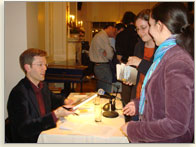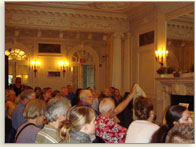www.derdiewas.de - Die Website zum Buch von David Bergmann
Navigation 1
Take me to your Umlauts! - page 3

Umlauts pose two general problems for English native speakers. First, how are they supposed to be pronounced? Second, when do they appear? The importance of these questions should not be underestimated! After all, these dots can lead to significant differences in meaning, as is demonstrated by the following sentences:
- "Ich zähle, während du zahlst." - (I'll count while you pay.)
- "Manche Leute werden geachtet, andere geächtet." -
(Some people are respected, whereas others are ostracized.) - "Der Bischof redete von schwülen Tagen, der Bürgermeister hingegen von Schwulen." -
(The bishop spoke of humid days; whereas the mayor spoke of gays.)
When it comes to native English speakers learning German, the umlauts challenge ("fordern") rather than assist ("fördern"). In this respect, the umlauts could be called the skunks of the language world: cute from a safe distance but potentially problematic the closer you get to them.

In spite of all of this, I just can't remain angry at the umlauts for very long. They are simply too adorable. My favorites are the small "ü" which looks like a smiley and the small "ö" which resembles a singing smiley! An English comedian once explained the popularity of umlauts among native English speakers as follows: "It's almost as if they had two eyes. You look at the umlaut, and the umlaut looks right back at you! I believe that, because of the umlauts, a close friendship can arise between the reader and the text being read."
back - 3 - next